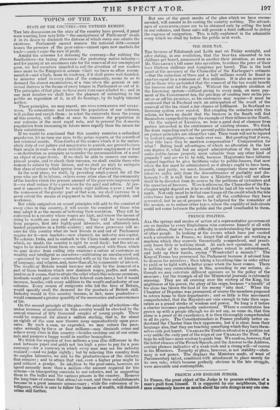FRENCH POLITICS.
ALL the springs and modes of action of a representative government are so familiar to every Englishman who concerns himself at all with public affairs, that we have a difficulty in understanding the ignorance of other people. In looking at the events which have just excited such a sensation in France, we forget that all parties are working a machine which they scarcely theoretically comprehend, and practi- cally know little or nothing about. At each new operation, at each fresh stroke of its mechanism, all parties retreat in astonishment, and hold up their hands, crying "Wonderful! a miracle !" The King of France has prorogued his Parliament because it advised him to dismiss his ministers ; thus taking a breathing-time in order either to yield or to fight with a better grace when the hour comes. Thete is nothing very extraordinary in this, according to our notions, al- though we may entertain different opinions as to the policy of the measure ; but the triumph of all the Ministerial journals is extremely amusing. They are all crowing over the victory of the King, the mightiness of his power, the glory of his reign, because "a breath" of his alone has blown the host of his enemy "into dust." When the Chamber of Deputies was prorogued, of course the members proposed to return home to their departments ; and so little is this movement comprehended, that the Royalists are vain enough to take their sepa- ration as a grand stroke of wisdom and power. So long is it before a charter becomes practically understood. Where a constitution has grown up with a people (though we do not say, as some do, that this alone is a proof of' its excellence), it is then thoroughly comprehended in all its parts. The Constitutionalists in France probably better un- derstand the Charter than their opponents, but it is clear, from their language also, that they are teaching something which they have them- selves only just learnt. CHARLES the Tenth is situated in a position not very unlike the early part of the reign of our CHARLES the First. We hope he will have more wisdom to guide him. We confess, however, that the lattei clauses of the French Speech, and the Answer to the Address, contain phrases indicative of a weak wish and a strong will—of course in his Ministers. Tenacity of place, however, is not stability—obsti- nacy is not power. The displays the Ministers made, of want of Parliamentary talent, combined with attachment to place merely for its own sake, which became perfectly obvious in the late struggle, were miserable and contemptible.


















 Previous page
Previous page